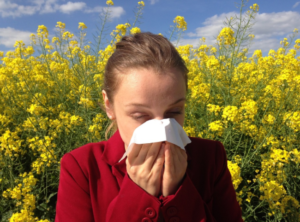 Spring may take longer to arrive than anyone likes, but all that rain, combined with the (eventually) melted snow and warming sun leads not only to May flowers, but also allergies.
Spring may take longer to arrive than anyone likes, but all that rain, combined with the (eventually) melted snow and warming sun leads not only to May flowers, but also allergies.
If you are sensitive to pollen – or dust, animal dander and the like – you can take actions that will help you suffer less. And while antihistamines can be effective, there are other, more natural, methods to combat the itchy eyes, runny nose and sneezing of spring allergies.
Try these
- Green tea, at the rate of two to three cups a day, may inhibit the reactions your body mounts to the invasion of pollen and other sneeze-makers. Studies suggest green tea is especially helpful if you start drinking it a couple of weeks before pollen season begins.
- Exercise is always good for you, but during the spring, allergy sufferers are better off getting their heart pumping indoors. The deeper you breathe outside, the deeper the pollen travels into your nasal passages. There’s no need to hide inside until most plants and trees stop blooming, but shorter walks for a while might be sensible.
- Drink water. This is another habit we should all practice year-round, but especially during allergy season. That’s because when you are dehydrated, your body produces more histamines, which in turn attack intruders to your body, like pollen, and cause allergy symptoms.
- Keep your living space clean. If you start sniffling as soon as you climb into bed, it’s time to wash the sheets and pillow cover, and maybe the pillow, too. Vacuum the carpet, and if you can manage it, stop letting the dog or cat sleep with you.
- Clean yourself, too. Taking a quick shower when you get home from work washes outdoor contaminants down the drain.
- Using a neti pot looks strange only when you view yourself in the mirror. Don’t watch and enjoy the benefits of washing your nasal passages once or twice a day with distilled water. You can find one at any pharmacy.
Acupuncture also treats allergies
As reported on Time.com and CNN, acupuncture offers long-term relief from allergies.
A study by the National Center for Biotechnology Information, a division of the National Institutes of Health, showed that acupuncture reduces a protein called cytokine that in turn prompts allergic reactions.
Allergy symptoms often are reduced with just one acupuncture treatment. After a number of weekly treatments, patients might return once or twice a year for a booster.
If the coming allergy season has you shaking – and sneezing – in your boots, contact me for a free consultation. We will talk about all the steps you can take to control your allergies and enjoy each season to the fullest.
Connect with Us!
FacebookLinkedin